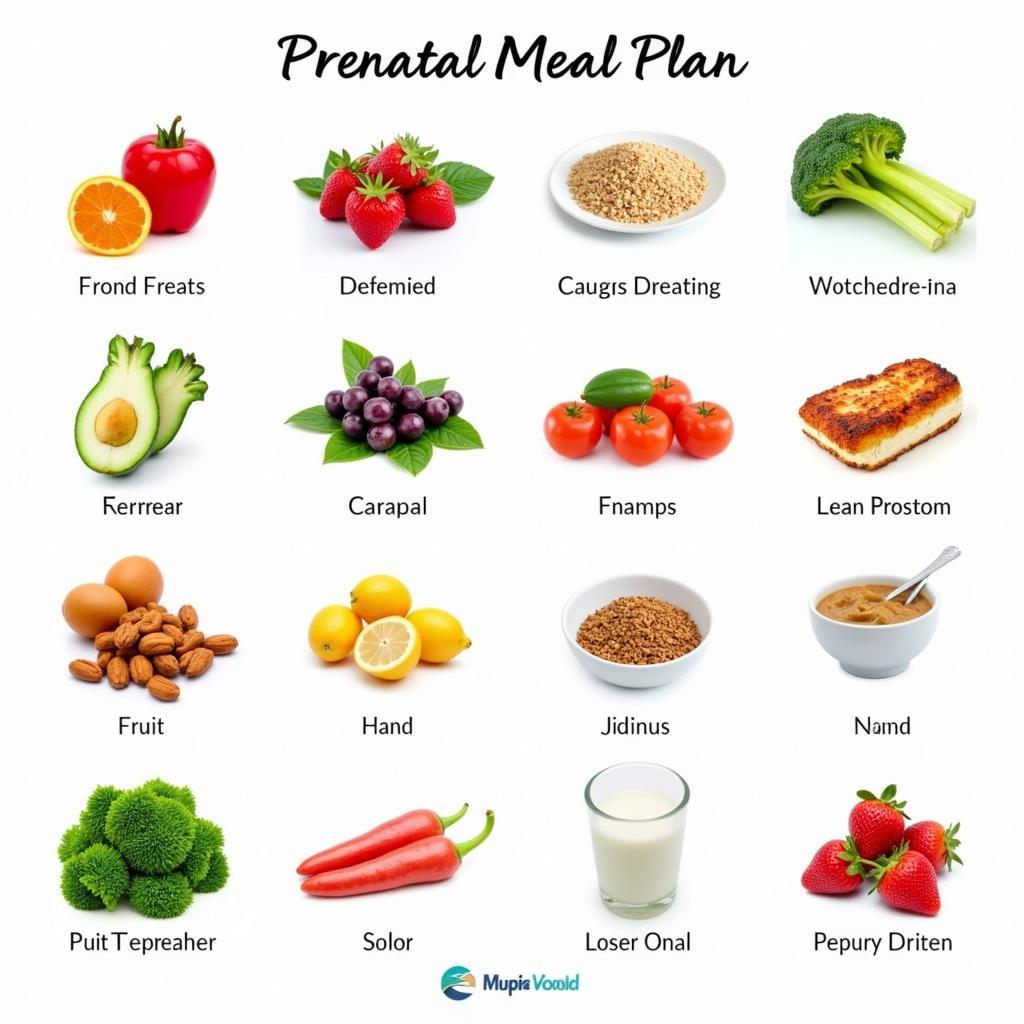Whole Food Prenatal nutrition is vital for a healthy pregnancy. It’s about more than just taking a prenatal vitamin; it’s about nourishing your body and your growing baby with the best possible nutrients from real, whole foods. In this guide, we’ll delve into why whole food prenatal nutrition is so important, what foods to focus on, and how to build a balanced diet to support a healthy and thriving pregnancy.
Why Choose Whole Food Prenatal Nutrition?
Opting for whole foods provides your body with a complex array of nutrients that work synergistically to support both your well-being and your baby’s development. Think of it like this: a symphony orchestra sounds much better than a single instrument. Whole foods offer a rich tapestry of vitamins, minerals, antioxidants, and phytonutrients that synthetic vitamins simply can’t replicate. Plus, they’re often easier for your body to absorb and utilize. whole food prenatal vitamins are a great supplement to your diet.
What are the key benefits? Whole food prenatal nutrition can contribute to a healthier pregnancy weight, reduce the risk of gestational diabetes, and even boost your baby’s brain development.
Essential Nutrients During Pregnancy: A Whole Food Approach
So, what should you be eating? Let’s break down the essential nutrients and where to find them in whole foods:
Folate: The Foundation for Healthy Development
Folate is crucial for preventing neural tube defects and supporting healthy cell growth. Instead of relying solely on supplements, include folate-rich foods like leafy greens, lentils, and citrus fruits in your diet. A whole food prenatal vitamin can help ensure you are getting adequate amounts.
Iron: Fueling Your Blood Supply
During pregnancy, your blood volume increases significantly, making iron essential for oxygen transport. Boost your iron intake with foods like lean meats, beans, and fortified cereals.
Calcium: Building Strong Bones
Calcium isn’t just for you; it’s vital for your baby’s developing bones and teeth. Dairy products, leafy greens, and fortified plant-based milks are excellent sources.
Omega-3 Fatty Acids: Brain Power
Omega-3s, especially DHA, are essential for your baby’s brain and eye development. Include fatty fish like salmon and plant-based sources like flaxseeds and walnuts in your diet.
Creating Your Whole Food Prenatal Meal Plan
Building a whole food prenatal meal plan doesn’t have to be complicated. Focus on variety and balance. Aim for a mix of fruits, vegetables, whole grains, lean protein, and healthy fats at every meal.
Example Meal Ideas
- Breakfast: Oatmeal with berries and nuts, scrambled eggs with spinach, or a smoothie with yogurt and fruit.
- Lunch: A large salad with grilled chicken or fish, lentil soup with whole-grain bread, or a veggie burger on a whole-wheat bun.
- Dinner: Baked salmon with roasted vegetables, chicken stir-fry with brown rice, or lentil pasta with marinara sauce.
Don’t forget snacks! Keep healthy options like fruits, nuts, yogurt, or whole-grain crackers on hand to curb cravings and maintain steady energy levels. Use our pregnancy food shopping list to stock up on essential ingredients.
“Focusing on whole foods during pregnancy is an investment in both your health and your baby’s future,” says Dr. Emily Carter, a registered dietitian specializing in maternal nutrition.
 Balanced Prenatal Meal Plan
Balanced Prenatal Meal Plan
Conclusion
Whole food prenatal nutrition is a powerful way to support a healthy and thriving pregnancy. By prioritizing nutrient-rich whole foods, you can provide your body and your growing baby with the essential building blocks for optimal well-being. Remember to consult with your healthcare provider or a registered dietitian for personalized guidance. Embrace the journey of whole food prenatal nutrition and nourish yourself and your little one from the inside out.
FAQs
-
What if I have morning sickness? Try eating small, frequent meals throughout the day and sticking to bland foods like crackers or toast.
-
Can I still enjoy treats during pregnancy? Yes, in moderation. Focus on whole food treats like fruit salads or homemade baked goods.
-
Do I need to take a prenatal vitamin if I eat a whole food diet? It’s always best to consult with your doctor, but many healthcare providers recommend a prenatal vitamin even with a healthy diet. Check out our range of Nutrimax food supplements.
-
What about food aversions? Food aversions are common during pregnancy. Don’t force yourself to eat foods you can’t tolerate, but try to find alternative sources of essential nutrients.
-
How can I stay hydrated? Drink plenty of water throughout the day. Aim for 8-10 glasses.
“Prioritizing whole food nutrition during pregnancy isn’t just about what you eat; it’s about setting the stage for a lifetime of healthy habits for both you and your child,” adds Dr. Sarah Miller, a leading obstetrician.
Further Reading
- Learn more about creating personalized nutrition plans with our food formulation services.
When you need support, please contact Phone Number: 02437655121, Email: minacones@gmail.com Or visit us at: 3PGH+8R9, ĐT70A, thôn Trung, Bắc Từ Liêm, Hà Nội, Việt Nam. We have a 24/7 customer service team.